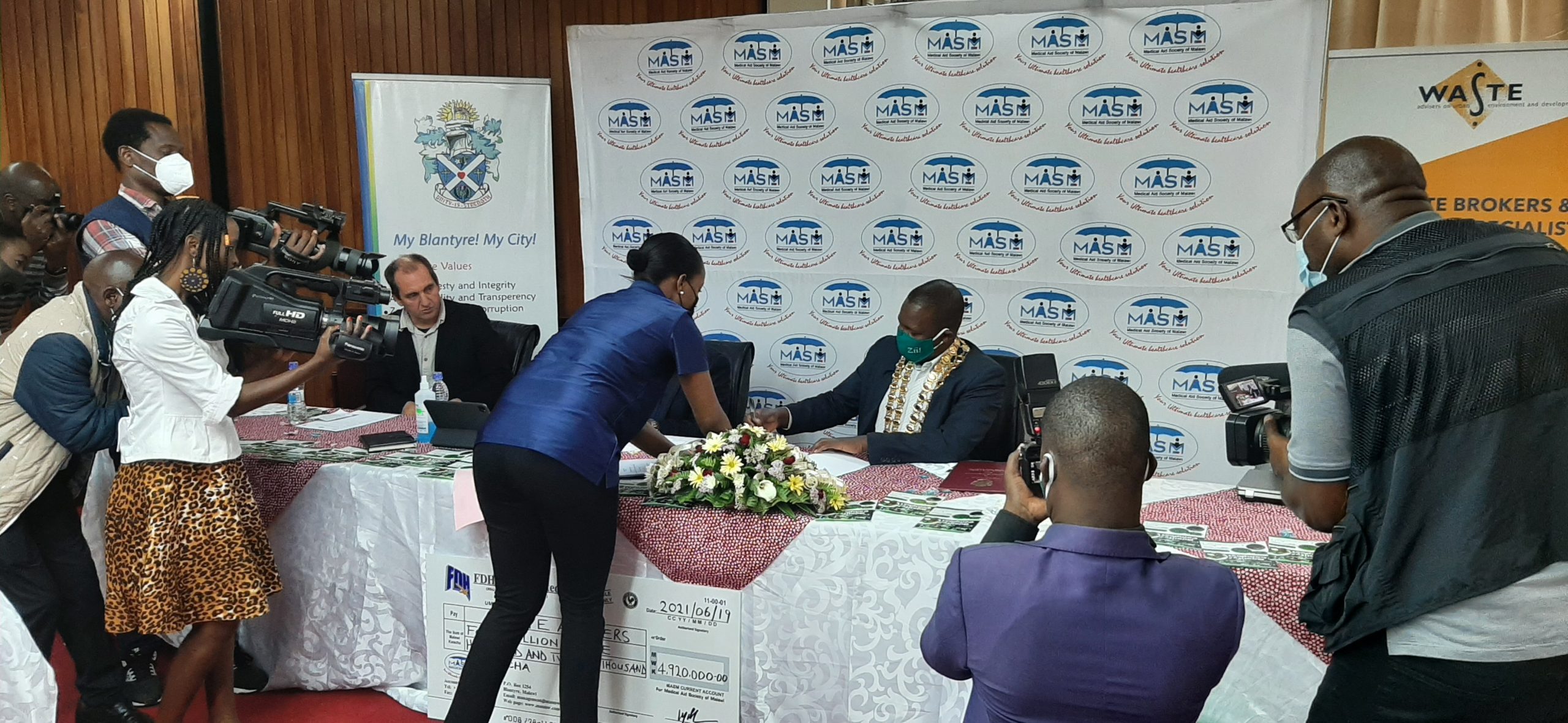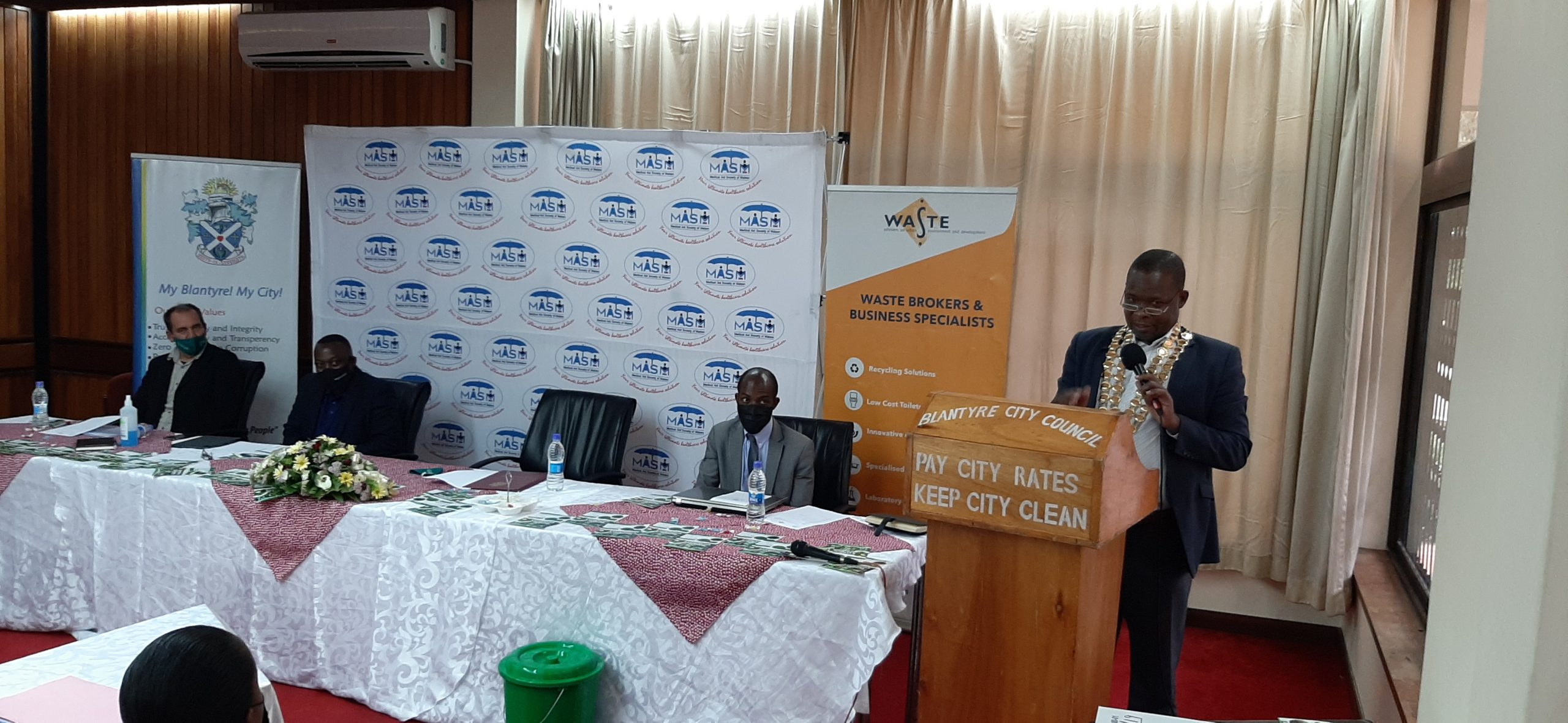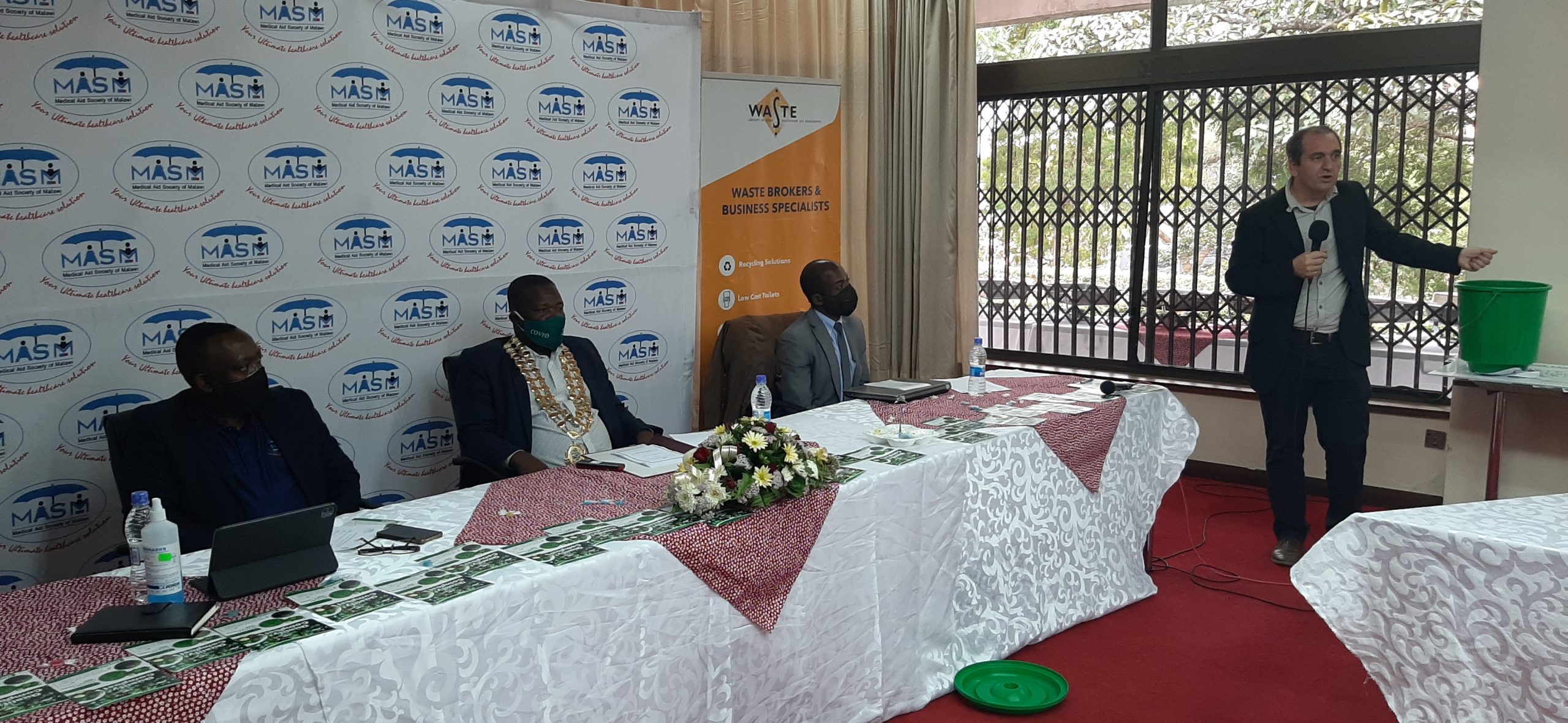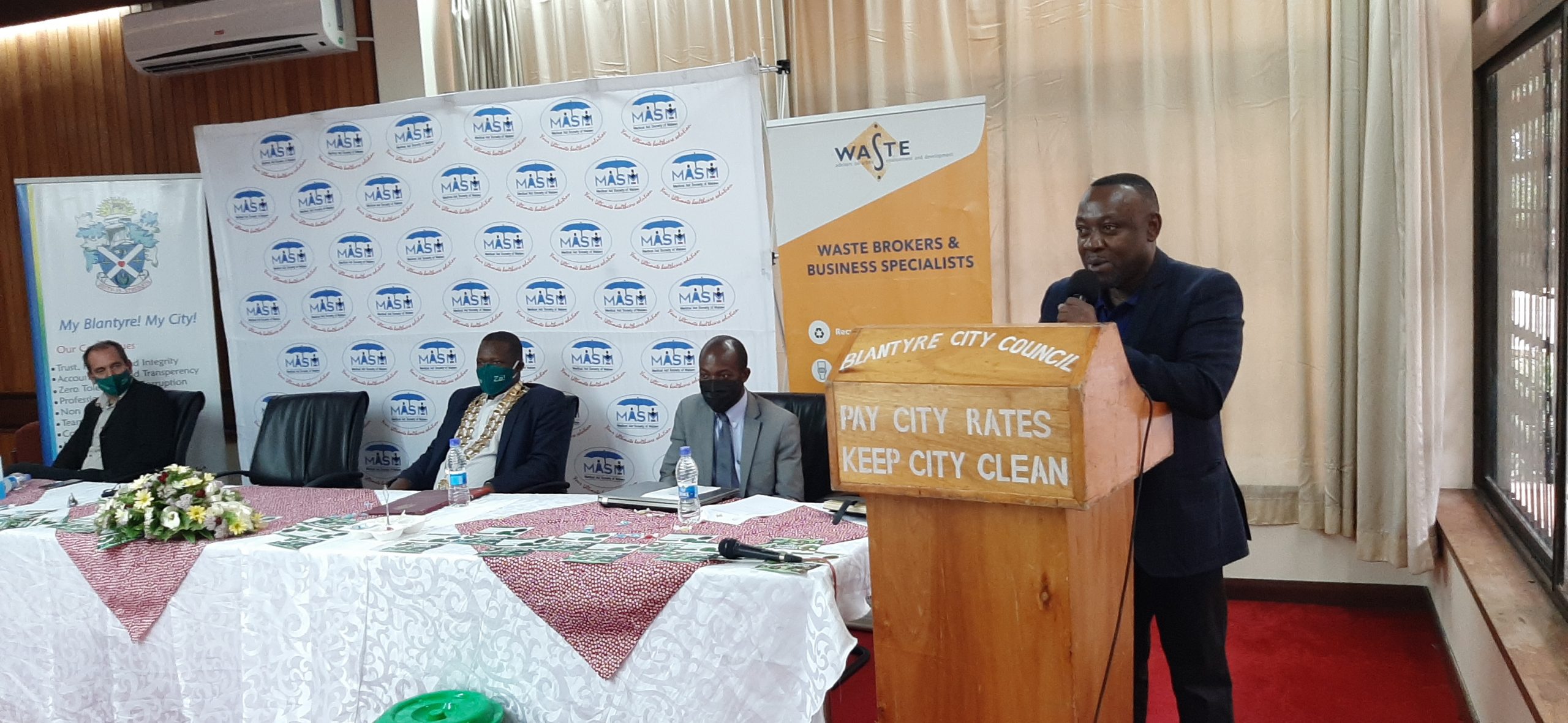ADDRESS BY HIS WORSHIP COUNCILLOR WILD NDIPO, MAYOR OF BLANTYRE CITY AT THE OCCASION OF WASTE MANAGEMENT AGREEMENT SIGNING CEREMONY WITH MEDICAL SOCIETY OF MALAWI

Fellow residents
Let me first thank each one of you for being here as we recognize MASM’s generous sponsorship in support of the City Council and residents of Blantyre City and usher in a new era of innovative solutions to some of our city’s most challenging problems.
I am incredibly excited about this and grateful to Mr. Sydney Chikoti and his team at MASM as well as to Mr. Bray and his team at WASTE Advisers for spearheading this initiative and supporting the residents of Blantyre City in keeping our city clean and our soils healthy.

Mayor Wild Ndipo addressing the residents
In my role as Mayor, I often think about what it is that the residents of Blantyre City deserve from those who serve them in the Council. As public servants, we are representatives of the people.
We come into work every day to ensure that the needs of Blantyre City residents are met, to ensure that their lives are improved, to ensure that we build a city for future generations that is more sustainable and more equitable than the one we found when we came into office.
At a minimum, I firmly believe that our residents deserve a clean environment, a high standard of public health, and reliable access to food and nourishment. To address this, it is clear to all of us here that waste management is a critical area for us to get right as a Council.

Billy Bray of Waste Advisors explaining how organic waste is turned into composite
We are incredibly grateful to MASM, WASTE Advisers, and the other partners in the room today that are working with us to meet this mandate. We spend a lot of time talking about plastic waste, as we have all become too familiar with the blue plastic bags and the water bottles that litter our roads and waterways.
But today, I would like to speak on organic waste. What many don’t realize is that while plastics are a highly visible issue, the most substantial waste management challenge facing Malawi, and facing Blantyre City specifically, is organic waste.
More than 85 percent of our city’s waste –stream is organic, meaning it can be decomposed. At the moment, most of this waste ends up burned, dumped in waterways or on the roadside, or disposed of at the landfill.
When this waste is burned, it emits harmful greenhouse gas that contributes to climate change and environmental degradation. When it’s dumped into waterways or on the roadside, it carries serious impacts on the environment and the public health of our residents.
Not only does it pollute and destroy aquatic environments and our surroundings, but it also serves as a dangerous vector for disease-carrying pathogens, insects, and rodents, which all contribute to illnesses and a general lack of well-being for those who call Blantyre home.
When it is sent to the landfill, it emits harmful methane emissions, which are 50 times more potent than carbon dioxide, and it seeps into surrounding soils and waterways bringing diseases to surrounding residents.
When one thinks about these impacts in the context of our vision to bring a clean environment, public health, and reliable nourishment to the people of Blantyre City, it becomes abundantly clear that this issue is a real priority for the government to address.
If we can sustainably tackle the organic waste issue in our city, we cut down on environmental degradation, reduce the incidence of waterborne, insect-borne, and food-borne illness, and ensure that our residents are provided with a city they can be proud of.
And it is our responsibility, and truly our privilege and honor, to work towards this as a Council. But just as much as this organic waste is a challenge, it also represents a brilliant opportunity.
If we can think innovatively about how we handle this waste, and we do not simply think about it in the traditional terms of ‘it’s just garbage, let’s get rid of it, and instead think about this waste as a resource, then we have a bold chance in our hands to set an example not just for Malawi, and not just for Africa, but for the entire world.
For the last seven years, we have partnered with WASTE Advisers to do just that. To envision strategies that let us as a Council and a City think about waste as a valuable resource.
Our relationship started with the successful development of more than 44 public toilets across the city to tackle our sanitation waste challenge. In the last three years, we have partnered on a wonderful co-composting operation to collect waste from our city’s markets and convert it into high-quality compost that can restore our soils and boost our crop yields.

MASM chief executive officer Sydney Chikoti delivering his speech
Today, I am thrilled to bring MASM into the picture, to gracefully accept their support for this pioneering work, to engage them as a responsible corporate partner as we take on the organic waste challenge.
MASM is our nation’s leader in public health. They ensure that so many of us are provided with the medical services we need to live healthy and meaningful lives. This sponsorship only further cements their commitment to protecting and enriching the public health and urban environment for all Malawians.
With this powerful sponsorship of nearly five million Kwacha, MASM is providing 80 waste separation bins, 1 new skip, and 3 months of transportation to move the waste from the markets to the compost treatment site, eliminating a large portion of the organic waste challenge we face as a city, and ultimately protecting the health of our residents.
As many of you know, we hold a lot of ‘discussions’ in Malawi. We talk about issues, we write hundred-page strategies. We come up with ten-year plans and bold visions for how things could look. And this is wonderful.
It shows that we are a nation of visionaries with bold ideas for our future as a country, ambitious plans for what Malawi will look like for our grandchildren and their grandchildren thereafter.
But how many of those visions, those grand strategies, are fulfilled entirely? How often do we take ourselves to task and ask ‘but what are we doing on the ground to see these come to fruition? What steps can we take today to see those strategies manifested tomorrow?’
And that, ladies and gentlemen, that, is why I am so excited about this event here today. As we launch this innovative program, it represents a concrete and exciting step towards many of the strategies and goals that we already have before us.
On Malawi Vision 2063, this partnership on waste management and composting allows us to make strides toward Pillars 1 and 3.
On Agricultural Productivity, the first pillar in the strategy, we will restore the nation’s soils and increase crop yields in a sustainable, climate-friendly fashion.
On Urbanization, the third pillar, this partnership represents a shift towards Blantyre becoming a ‘smart city’ with a well-planned use of resources and public-private partnerships to tackle waste management issues.
On the National Waste Management Strategy, launched last week by Hon. Nancy Tembo, MP, Minister of Forestry and Natural Resources, this initiative is a tangible action plan for waste separation and the development of a fully circular economy for urban waste and refuse, two critical components of the document.
And with that, let us see this event from two angles. For one, let us allow ourselves to celebrate MASM, WASTE Advisers, and the Council for pioneering this innovative initiative and for the long hours and years of progress that have gone into getting us here.
Secondly, and perhaps most importantly, let us see this event as a starting point, a new day, the ushering in of a new era for the private sector and government at all levels.
An era of innovation in corporate social responsibility, in the way private sector players like MASM partner with the government on strategic projects, in finding unique solutions to the most challenging problems to build a better future for Malawi.
And let this be a beacon of hope and an invitation. An invitation for more corporate partnerships on this initiative. An invitation for new ideas from residents and from companies on how we can take it even further.
An invitation for the rest of Malawi to follow suit and to learn and share with the Blantyre City Council as we step into this new era.
I hope to look back at this event and see it as the launch of something crucially important for our nation. To see MASM and WASTE Advisers as pioneers in this field.
To read about how Malawi set the example for the rest of the world and how we built resilient circular economies from waste.
May God Bless all of you. May God Bless Blantyre City and its residents. May God Bless Malawi.
I thank you for your kind attention
